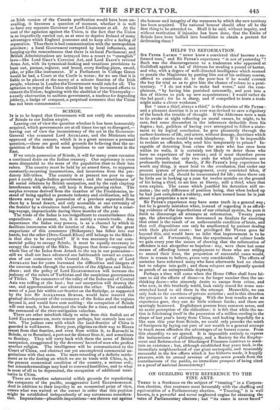HELPS TO REFORMATION.
SIR Pexen LAURIE " never knew a convicted thief become a re- formed man: and Sir PETER'S experience " is not of yesterday " Such was the discouragement to a tradesman who appeared at Guildhall against a lad of thirteen for stealing a pound of butter, and who, with a degree of well-directed intelligence which seemed to puzzle the Magistrate by putting him out of his ordinary course, offered to contribute 51. to the poor-box if he would commit the boy for trial so as to give him the chance of reform in a peni- tentiary. " I do not wish to make bad worse," said the com- plainant, " by having him punished summarily, and sent into a den of thieves to pick up new acquaintances : I would rather do the lad good ; for he is sharp, and if compelled to learn a trade might make a clever workman."
But " once a thief, always a thief," is the doctrine of Sir PETER : and a pleasant doctrine it is as ever was devised to save a dignitary of the bench the trouble of thought. If the Alderman were a man to lie awake at night reflecting on moral causes, he might, to be sure, find some discomfort in the inferences deducible from his dogma ; but, guiltless of having ever attempted to follow a state- ment to its logical conclusion, he gets pleasantly through the surface-business of life, and utters, without damage, doctrines which from other mouths would be rank blasphemy. If it be impossible to reclaim an offender, why send him temporarily to prison ? In- capable of deterring from crime the man who has once been within its walls, it is certainly not likely to deter those who have no experience of its terrors ; and it must therefore prove useless towards the only two ends for which punishments are professedly instituted. Surely, if Sir PETER'S long experience be worth any thing, it must lead to the conclusion, that under our present system of prison-management, every convicted felon, if incarcerated at all, should be incarcerated for life ; since there can be little use in locking up a man for twelve months on the ground of his being a thief, to set him at liberty, still a thief, when that term expires. The cause which justified his detention still re- mains ; the only difference of position being, that when locked up he had just completed a robbery, and when turned loose he is just about to perpetrate a new one.
Sir PETER'S experience may have some truth in a general way; but he is greatly mistaken when, instead of regarding it as afford- ing evidence of the imperfections of our criminal system, he puts it forth to discourage all attempts at reformation. Twenty years ago, the phrenologists were denounced as fatalists for asserting that crime is the result of an unfavourable condition of brain, and that evil dispositions can only be ameliorated by patient dealing with their physical cause : but privileged Sir PETER goes far beyond this, and would have us infer that improvement is to be despaired of. Fortunately, from the experiences of calmer heads we gain every year the means of showing that the reformation of offenders is not altogether so hopeless : nay, were there but some means of affording honest employment to those who are willing to amend their lives, the proportion of successful cases would, there is reason to believe, prove very considerable. The efforts of societies have reformed many who have afterwards had no choice but to relapse into guilt ; and these relapses are flippantly quoted as proofs of an unimpressible depravity.
Perhaps a time will come when the Home Office shall have lei- sure to aid the efforts of those—a far larger number than the un- thinking deem—who sincerely desire to escape from crime, and who now, in this brotherly world, look vainly round for some out- stretched hand to aid them in the attempt. Meanwhile, we can only look to the exertions of private societies ; and in this direction the prospect is not encouraging. With the best results as far as experience goes, they can do little without funds; and these are sparingly bestowed. Englishmen possess keen common sense, and an acute perception of the ridiculous : it is felt that while the na- tion is felicitating itself in the possession of a million sterling in the shape of last year's booty from China, and looking hopefully for a
like sum this year from Scinde, we could only provoke the mirth of foreigners by laying out part of our wealth in a general attempt to teach mean offenders the advantages of an honest course. From this absurdity we are spared. It is impossible entirely to repress the indiscretions of philanthropy, and a Society for the Employ- ment and Reformation of Discharged Prisoners contrives to main- tain an existence ; but, although established four years back, lathe immediate neighbourhood of our giant metropolis, and reasonably successful in the few efforts which it has hitherto made, it happily presents, with its annual revenue of sixty-seven pounds from the contributions of the public, no immediate prospect of being cited as a proof of national inconsistency!


























 Previous page
Previous page